LifeGift, LifeShare and TOSA Conduct First-Time Uncrewed Aerial Transport of Organs Between Lubbock, Oklahoma City and San Antonio
November 16, 2022Groundbreaking Technology Aims to Improve Transport of Donated Organs and Tissues by Use of Drones in Rural Areas to Overcome Patient Inequities
LifeGift, the non-profit organ and tissue donation organization serving 109 Texas counties in Southeast, North and West Texas, LifeShare in Oklahoma City, Okla., and Texas Organ Sharing Alliance (TOSA) in San Antonio, Texas, joined forces with the Matador Uncrewed Aerial System (UAS) Consortium, co-developed by Texas Tech University Health Sciences Center (TTUHSC) and 2THEDGE, LLC., and Specialist Direct Inc. to conduct an uncrewed aerial transport (UAS) to test the ability to successfully move organs between Lubbock, Oklahoma City and San Antonio. The test took place on Tuesday, November 15th with the UAS flight originating at Lubbock’s Texas Tech University Reese Technology Center proceeding a distance of 350 miles to Oklahoma City, and then traveling 471 miles to San Antonio.
This is the first time that donated organs were transported this far a distance by an aerial system that was operated using robotic technology. The Optionally Piloted Aircraft (OPA) transported a donated human liver, kidney, and pancreas between the three cities. Although there was a pilot on board per FAA regulations, the plane was flown entirely by technology onboard. The organs were donated for clinical research and were not transplanted following the flight demonstration.
During these flights, Texas Tech University Health Sciences Center (TTUHSC) conducted research to establish baseline data of the impact environmental conditions have on donor organs during flight operations. This research, combined with both a static bench test and a typical ground transportation route of several hundred miles, will provide better understanding of the effect environmental conditions may have on tissue and organs.
The three organ procurement organizations’ proposed use of this groundbreaking UAS technology aims to improve transport of donated organs and tissues in rural areas to better serve patients.
LifeGift, LifeShare and TOSA’s shared objectives include:
- Address transportation challenges in the facilitation of organs for transplant and minimize the time between organ recovery and transplantation.
- Test the efficacy of transporting organs and biological materials via Uncrewed Aerial Transport (UAS) technology from hospitals in rural areas to transplant programs.
- Increase efficiency of the logistics involved in the testing of biological material to allocate organs and the recovery of donated organs.
- Continue to drive innovation and technology to better serve all patients especially those located in rural areas.
“The use of uncrewed aerial system transportation of organs and associated tissues is a critically important mode of transportation to facilitate faster and more reliable movement of organs for transplant, especially in rural areas such as West Texas and neighboring areas,” LifeGift President and Chief Executive Officer Kevin Myer said. “Our partnership with LifeShare, TOSA and the Matador UAS Consortium aligns with our focus on research and innovation to drive performance improvement across the donation system to more effectively serve patients and save more lives through organ transplantation.”


